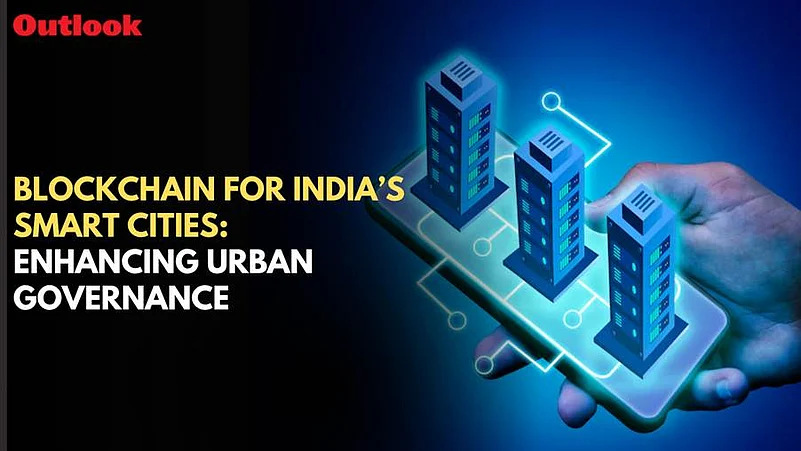India is undergoing a rapid evolution in how its cities operate and grow. With increased urbanization, the country has an urgent need for smarter and more efficient cities. The government of India has been working on its Smart Cities Mission to improve infrastructure, public services, and governance in general with the help of digital technology. A new technology such as blockchain has the potential to transform urban governance.
Blockchain is increasingly associated with cryptocurrencies, but its use goes beyond that. Blockchain is basically a method of storing data in a manner that makes it extremely difficult to hack into or modify. All the data or transactions are kept on a network of computers such that the data is transparent, secure, and trackable.
In the case of smart cities, blockchain technology can be a useful means for managing public records, reducing corruption, promoting smooth delivery of services, and increasing the confidence level of citizens in the government framework. Let us now examine how blockchain can improve Indian smart city governance.
Digital Identity and Citizen Services
Identification and verification of millions of people is one of the largest challenges of urban management. In the majority of Indian cities, access to basic needs such as water supply, electricity, public transport, and medical care can be delayed because of inadequate documents or false information.
With blockchain, a digital identity can be created for every citizen, keeping their important documents such as birth certificates, land ownership, and service history safely. It is not easy to manipulate this digital identity and can be viewed online in real-time by any government department. It stops duplication, forgery, and human errors, which allows for quicker and more accurate delivery of services.
Transparent Land Records and Property Ownership
Land litigation is the most common legal issue in India. Most of the time, property records are mostly old, incomplete, or altered for fraudulent intent. Blockchain can be utilized to digitize and keep land and property records in a safe, tamper-evident manner. Once entered into a blockchain, the time line of ownership of a property can be easily tracked. This brings in transparency and becomes safer to buy or sell real estate. This also avoids corruption in land deals and protects the citizens from fraudulent claims of land.
Efficient Public Procurement and Government Expenditure
Smart cities involve massive investments in massive infrastructure projects like roads, drainage, digital surveillance, intelligent streetlights, etc. Unfortunately, most major projects are plagued with cost underestimation, delayed project completion, and lack of accountability. Blockchain can be employed to track the government spending under such schemes by recording each transaction being spent in the course of government procurement on a public and secure platform. This has the potential to deliver contracts publicly, money being spent for what it is being spent, and an open audit trail for each rupee spent.
Improved Waste Management and Utility Monitoring
Smart cities attempt to improve fundamental services like garbage collection, water provision, and electricity supply.
Blockchain is used to monitor the whole value chain of the services. For example, bins can be associated with sensors reporting to the blockchain when a bin is full in order for garbage collection to be done in good time. Water consumption and power consumption can be tracked and billed accordingly to reduce loss and increase sustainability.
Citizen Feedback Mechanisms and Participation
For a smart city to operate in the real world, its people must be incorporated in decision-making. Voting and comments through blockchain can enable its people to easily provide opinions on issues at a local level, help in city planning, or assess government services. Because these records are permanent and open, this serves to enhance trust in civic processes and provide citizens with the confidence that their voices will be heard and that they will be counted fairly.
Security and Data Integrity
Smart cities are data-hungry. Traffic lights, CCTV cameras, utility meters, environmental sensors 바카라ď thousands of bytes of data are pouring in daily. Safeguarding the data is paramount. Such data can be secured by Blockchain to keep their integrity from being compromised. Each time data is going to be transferred or exchanged between systems, they are placed in the blockchain and any criminal tamper will be easy to identify. Cybersecurity is enhanced and critical infrastructure is protected against criminal breaches.
Challenges and Implications
Though there are pros and cons of blockchain in city management, there are also implications. Greater investment in digital infrastructure, human capital, and interdepartmental coordination is required to implement blockchain technology. Public training and awareness also need to be conducted to familiarize officials and citizens with the system's working.
Secondly, blockchain is not a panacea for all governance problems. Blockchain is a technology that has to be applied with good policy, sound legal structure, and appropriate implementation. Data privacy바카라Ēhow do we ensure that citizen data in the blockchain are safe from abuse바카라Ēis another critical issue.
Conclusion
Blockchain has the potential to transform the governance of Indian smart cities. It can introduce transparency, accountability, and efficiency into public services. By enabling secure data transfer, trusted identity systems, and citizen engagement, blockchain can help build smart cities that are smart in governance as well. As India continues to urbanize further, having an understanding of blockchain as a tool of digital governance can make it easier for city living for tens of millions of citizens, making it simpler, more equitable, and responsive.














